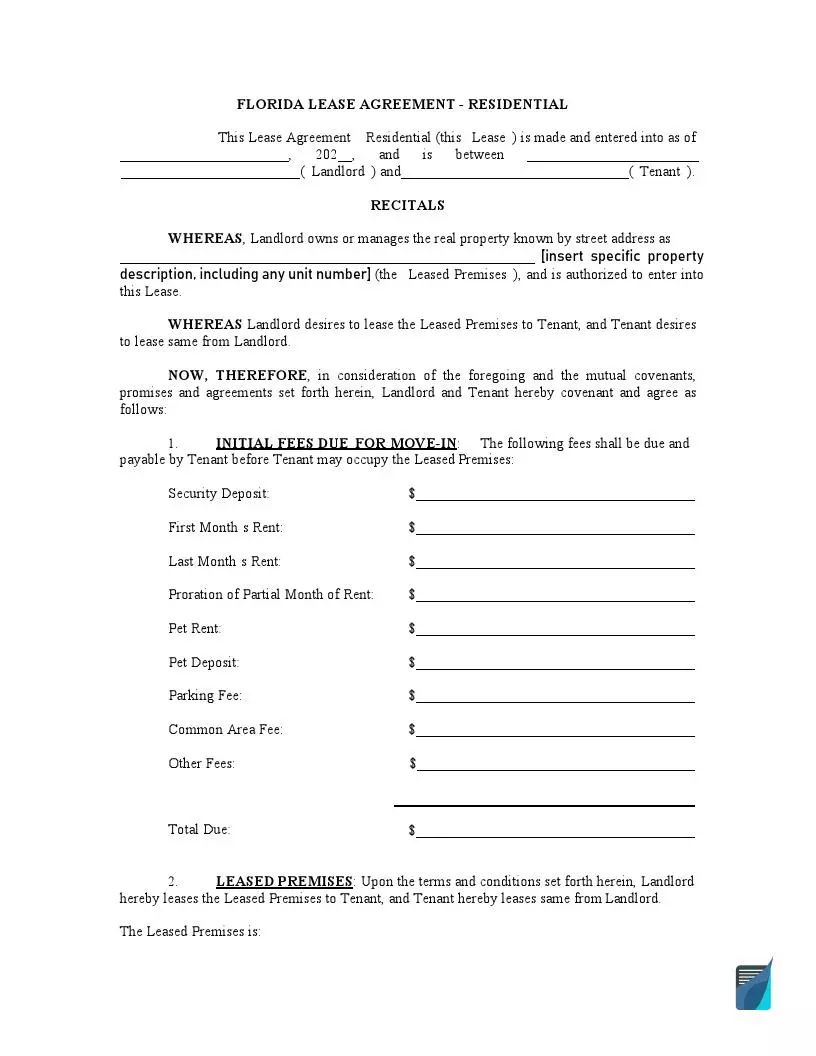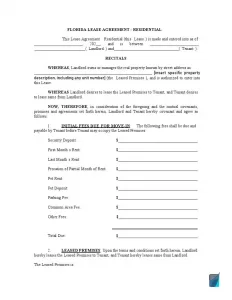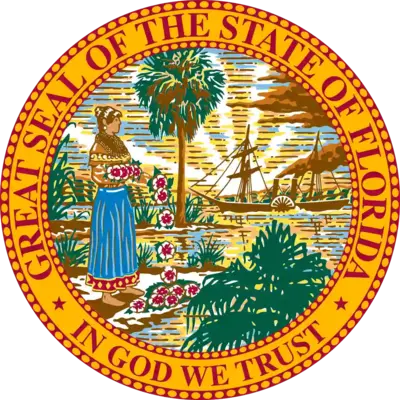Florida Rental Lease Agreement Forms
Rental lease agreements in the state of Florida establish lawful relationships between a landlord and a tenant committed to paper. In the US, the terms and conditions to maintain corresponding relations legitimately differ from state to state and, in some cases, from county to county. In Florida, they are regulated by Title VI, Chapter 83 of the Florida Statutes.
Under Florida laws, the agreements become legit only when completed and authorized in writing by both the landlord (lessor, the owner) and the tenant (lessee). The essence of the document is to show that the premises owner provides the tenant a dwelling unit or commercial space for personal uses in exchange for periodic payments (rent).
The lease agreement creates extra protection for both parties by preventing potential abuse of power on the part of landlords and possible lack of responsibility on the part of tenants.

Build Your Document
Answer a few simple questions to make your document in minutes
Save and Print
Save progress and finish on any device, download and print anytime
Sign and Use
Your valid, lawyer-approved document is ready
Types of Lease Agreements
Florida introduces several types of lease agreements. You can generate your preferred type using templates from our latest software. The list below shows the most common types of lease agreements:
- Standard Residential Agreement. This form is genuinely the most popular type among the rental contracts. It declares that a lessor assigns a dwelling unit to a person for rental reimbursement.
- Commercial Lease Agreement. This variation of the contract is useful for business purposes. A lessee applying for commercial spaces, like offices and industrial buildings, makes an arrangement with the property owner to run business matters on the described premises.
- Termination Lease Letter. This contract is created by either party to notify the other member of the agreement about the cancellation of the lease deal. Under Florida’s laws, one may apply a termination lease letter not later than 15 days to the upcoming rental reimbursement.
- Roommate Agreement. To maintain healthy relations between the lessees of a shared dwelling unit, the tenants can execute a room rental agreement and assign the responsibilities and powers of each dweller of the premises. This helps to prevent disputes among the lessees in the future.
- Month-to-Month Rental Agreement. Following the terms of this alternative, there is no end date of the agreement. The arrangement is prolonged month after month by default unless any party issues a termination notification.
- Sublease Agreement. A renter can grant a lease of the dwelling or commercial unit to another rentee (or a subtenant). However, following the laws, the property owner must give permission to these manipulations and make corresponding recordings in black and white.
- Lease-to-Own Agreement. This contract option allows the tenant to rent a property with an option of buying out the unit.
Florida Rental Lease Agreement Form Details
| Document Name | Florida Rental Lease Agreement Form |
| Other Names | FL Rental Lease, Florida Residential Lease Agreement |
| Relevant Laws | Florida Statutes, Title VI, Chapter 83, Part II |
| Security Deposit Amount | No limit |
| Security Deposit Return | Thirty (30) days (if deductions), or fifteen (15) days (if no deductions) |
| Avg. Time to Fill Out | 18 minutes |
| # of Fillable Fields | 119 |
| Available Formats | Adobe PDF |
Florida Laws and Lease Requirements
Once rendering a decision to rent or grant a lease of a dwelling or commercial unit, you should be aware of the general requirements by the state of Florida.
Below, you will find some requirements that may be of great assistance both for potential lessors and lessees.
Landlord’s Identification Disclosure
Relying on Title VI, Chapter 83.50 of the Florida Statutes, the landlord or a designated agent should provide their legal name and address to the tenant(s).
Security Deposit
A security deposit section covers the terms and regulations of deposit payment (if any) and must be included in every agreement.
A security deposit is an amount of money a landlord withholds from the tenant to provide security if the tenant damages the property in some way. The landlord has 30 days to inform the lessee of the account bank where the deposit is being held and provides a deposit receipt. Florida doesn’t provide any recommendations on the deposit amount.
Every Security Deposit section must contain the text from Title VI, Chapter 83.49-2 (d) of the Florida Statutes.
Suppose there are no deductions from the security payment; the lessor should give back the whole sum within 15 days. Otherwise, the property owner must return the deposit not later than 30 days after the tenant vacating.
Termination Letters
The landlord provides a notice to terminate a lease relying on the type of renting agreement. The terms are described in Title VI, Chapter 83.57 of the Florida Statutes and are as follows:
- 60-day notice for annual rental
- 30-day notice for the quarter-to-quarter periods
- 15-day letter for the month-to-month terms
- 7-day notice for weekly lease
Popular Local Rental Lease Agreement Forms
Landlord Right of Entry Disclosure
Following Title VI, Chapter 83.53 of the Florida Statutes, the tenant cannot deny the landlord of periodical inspections of the premises. However, any lessor must notify the tenants at least 12 hours before any reasonable inspection. The purpose of this visitation may be for repairs or for any other agreed terms. Abuse of power may be considered harassment and discrimination.
The property owner is granted ready access without notifying the lessees if:
- emergency arises
- the tenant gives permission
- there are issues of unreasonable refusal to access the premises
- the lessee is absent for more than half of the rent period without notifying the owner of possible absence.
Eviction Regulations
Florida introduces two reasonable arguments for eviction.
- Absence of Rent. If the lessee fails to pay the rent, the property owner can send a 3-day notification to resume the payments or vacate the premises. If the rentee does neither, the lessor may turn to the courts.
- Violence of Compliance. The lessee obtains a deadline of 7 days to either agree with the compliance of the deal or vacate the rented property.


Other important Florida templates available for download on FormsPal and that can be customized in our simple document builder.
Other Rental Lease Agreement Forms by State
